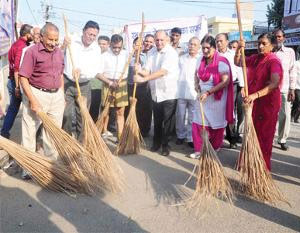
Finally, it is great to have a leader not just talk about 'Swachh Bharat' but also set a timeline within which to achieve it. Even though this is a mandate from the prime minister, it has to be delivered for the people of India by the people of India. The task is enormous and will require a change in individual behaviour as well as a transformation in the back-end capability to provide the tools, processes, systems and structures that make hygiene, cleanliness and sanitation achievable and sustainable.
It is also essential to define what swachh actually means. Building toilets is an important dimension. But there are at least two other equally significant ones: hygiene and how we deal with garbage. Several countries have adopted WASH (Water, Sanitation & Hygiene) as part of their nutrition-sensitive interventions.
There are significantly improved nutritional outcomes as a consequence of better hygiene, sanitation and access to potable water.
Right now, we are perfectly engineered to co-exist with the lack of sanitation that surrounds us. Unless the entire system is overhauled, we will not see a lasting effect. That system includes each of us as generators of garbage and various organisations, from municipal corporations to the ministries that deal with solutions to hygiene and sanitation.
All three — hygiene, sanitation and garbage — require an understanding of the hardware and software that must be activated to get the final result. There are several examples of serious initiatives to build toilets in cities (hardware) that fall into disuse very quickly because the beneficiaries don't see the value proposition.
Understanding the economic and social model that makes this goal palpable, achievable and enduring is critical to its success. Unless we adopt a systemic approach and hold each actor in the chain accountable (through motivating a behavioural change and/or by imposing hefty penalties for non-compliance), we are unlikely to meet with enduring success.
Take the case of garbage and the perennial reality of landfills on the one hand, and garbage everywhere on our streets, on the other.
Not segregating at source makes the problem even more obtuse.
Add to that the fact that we seem to be over-packing everything — magazines are sold in plastic covers, bouquets of flowers are generously wrapped in a lot of paper, five-star hotels pack slippers in a plastic bag which is then put in a cardboard!
The travesty is that we have enough answers and common-sense solutions to get started.
Talk to anyone who has spent any time in garbage and they will give you the mantra of reduce-reuse recycle and segregate the wet and dry at source — both of which intuitively make sense and are doable, once we have the conviction and the desire to be part of the solution.
For us to get started and focused, we also need to create an architecture of how garbage must be handled.
Of the approximately 4,000 tonnes of garbage generated every day in Bangalore, bulk generators like offices, hotels, schools and colleges account for over half. These are easily identifiable and reachable targets that also have the capacity and capability of reducing, recycling and reusing their own garbage by investing in simple available technologies that enable the wet garbage to be composted and the dry garbage to be recycled, or even converted to polymer oil in the case of plastics. Even though solutions are known, there is apathy among the institutions to tackle this issue systemically.
Swachh Bharat requires a lot more than brooms on the streets. It requires a comprehensive and coordinated effort to create the back-end infrastructure to deal with solutions to segregate at source, create dry waste collection centres, compost the wet waste to make it reusable as soil, etc. Most of all it will require a massive behavioural change and significant investment in creating a garbage management system that uses science, technology and logistics that convert garbage to something of value. Take the example of fleece jackets and plastic furniture made from PET bottles, or polymer fuel from all kinds of plastics.
The Andolan has to be achieved with comprehensive programmes, a tighter regulatory framework (eg. all buildings with more than a 100 people have to compulsorily deal with their wet waste) and large-scale participation.
We have to envision a country that does not force its children to become rag pickers to eke out a living.
The writer is former Managing Director, Britannia.